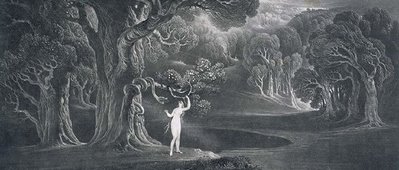
It’s been almost a year since it was first announced that Legendary Pictures and Scott Derrickson were developing a movie version of John Milton’s epic poem Paradise Lost. There hasn’t been much news since — but the New York Times did post this story today:
“AS soon as you started talking about a battle in Heaven, he just couldn’t relate,” the screenwriter Philip de Blasi recalled.
It was a particularly demoralizing pitch meeting, explained his writing partner, Byron Willinger, because the producer, “this guy who has made some of the most successful blockbusters ever, started looking at his nails, and I don’t think he looked away from his nails for the whole 15 minutes.”
Then there was the studio executive who, halfway through the pitch, blurted: “Wait a minute. You mean God is God?”
Such were the travails of the writers who traveled from New York to Hollywood in 2004 to hawk their adaptation of “Paradise Lost.”
For two novice screenwriters John Milton’s 17th-century epic poem, which tells the story of Lucifer’s fall and the temptation of Adam and Eve, was an audacious choice of material. “We figured someone’s going to make a movie of it someday, and it might as well be us,” Mr. Willinger said in a telephone interview.
They persevered and finally made a rendezvous with fate years in the making. Almost three decades before, a little boy named Vincent Newman was skimming through the Bible, desperate for something to relieve the boredom that was Sunday school in Fresno, Calif. Finding mention of a fight between angels and devils, he jolted awake, and thus began a lifelong fascination with battles between good and evil.
Mr. Newman, now 39, is an independent producer of medium-size movies with midrange male stars (most recently “A Man Apart” with Vin Diesel) who has long dreamed of exploring his boyhood curiosity by making a “Paradise Lost” movie. Then, after stumbling upon mention of the poem in a Christian inspirational book [by John Eldredge] called “Epic: The Story God Is Telling and the Role That Is Yours to Play,” his dream turned to resolve. At lunch one day, Mr. Newman said, an agent asked him “out of the blue if I’d ever heard of ‘Paradise Lost.’ ”
“He said, ‘I’ve got these clients, these guys are crazy enough that they wrote this thing on spec.’ ”
Mr. Newman bought the script and arranged co-financing with Legendary Pictures, which, with Warner Brothers, produced “Superman Begins” and “Batman Returns.” Legendary’s chairman and chief executive, Thomas Tull, said his first response to the idea was, “Well, that’s going to make a lot of older folks relive bad college experiences.” Later he realized that “if you get past the Milton of it all, and think about the greatest war that’s ever been fought, the story itself is pretty compelling,” he said.
As with any Hollywood development project, things are changing along the way. The original script hewed a bit too closely to Milton for the producer’s taste, for instance. Mr. Newman, by his own account, told the writers he wanted “less Adam and Eve and more about what’s happening with the archangels,” the battle in Heaven between God’s and Satan’s armies.
“In Eden there’s the nudity problem,” he pointed out, “which would be a big problem for a big studio movie.” . . .
The filmmakers hope that “Paradise Lost” will prove enticing to Christian audiences. Mr. Hazeldine said he read “several theological tomes” because “I’m adapting Milton, and then Milton’s kind of adapting Genesis, and I wanted to make sure that for the faith audience, I guess, that they will see it more as ‘The Passion of the Christ’ than ‘The Last Temptation of Christ’ ” — that is, more a reverent treatment of Biblical material than a reconsideration. Both he and Mr. Derrickson said they are Christians, as are Mr. Newman and the script’s original writers. Even so, Mr. Newman said the film is not “a Christian endeavor or Christian movie.”
But he added that it would be “made with total adherence and respect to any of the three religions’ involvement in the story of God, the Devil and the archangels,” referring to Christianity, Judaism and Islam. But “it’s a war movie at the end of the day,” Mr. Newman said.
As a Christian, Mr. Hazeldine said, the project poses “a challenge for people like Scott and I, who have a faith, but we just love movies.” He added, “We often find that we are wondering, are we too worldly for the church and too churchy for the world?” . . .
There’s a fair bit more to the story, and it’s all worth reading. As to the nudity problem, I recommend doing something digital. If they can erase Ralph Fiennes’ nose for the Harry Potter movies, then, um, surely something can be worked out here, too.












